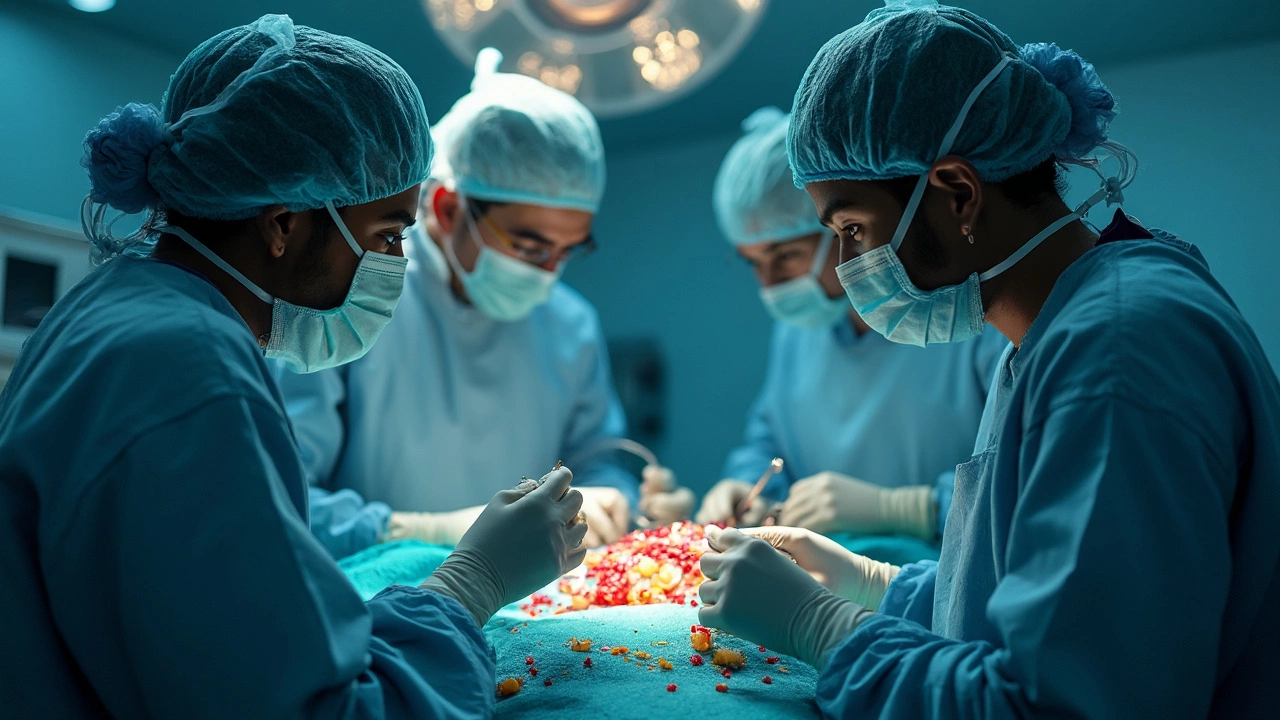When it comes to heart surgeries, pain often feels like the unwelcome guest no one invited. They're not just physically demanding but take a toll on your mind too. Ever thought about what surgeries top the charts for being the most painful? Surprisingly, open-heart surgery and thoracic aortic aneurysm repair make the cut. They're not only about skilled hands but also encompass intense post-operative experiences.
Consider this: during an open-heart surgery, your ribcage is actually being opened. Yep, you read that right! This procedure is crucial when treating blockages or repairing the heart valves. No wonder the pain follows through the recovery phase, making it one of the most dreaded aspects of the whole process.
As for thoracic aortic aneurysm repair, it involves fixing that bulging, weakened section in your artery wall which can be daunting enough. Fun fact: it combines the challenge of dealing with both a delicate artery and painful post-surgery recovery.
- Understanding Heart Surgery Pain
- Open-Heart Surgery: A Detailed Look
- Thoracic Aortic Aneurysm Repair Explained
- Managing Pain Post-Surgery
- Emotional and Physical Recovery Tips
Understanding Heart Surgery Pain
So, what makes heart surgery so painful? It's not just the procedure itself, but the intense aftermath. Your body undergoes a lot of stress, and the path to recovery can feel like climbing a mountain. Let's break down why this pain happens and what it's all about.
The Physical Toll
Think about it: during surgeries like open-heart or thoracic aortic aneurysm repair, layers of skin, muscle, and bone are all involved. Your ribs might even be spread apart for doctors to access your heart. That’s bound to leave an impact, and naturally, your body protests.
Why It Hurts
The pain is not just superficial. It also stems from nerve endings being disturbed or damaged during surgery. This isn't like cutting your finger—it involves deep, intricate systems in your body, making the sensation far more intense.
Pain Over Time: Beyond Just Physical
Pain after surgery isn't always just physical. Emotional well-being can take a hit too. Coping with pain daily can lead to feelings of frustration or helplessness, making it doubly challenging. Believe it or not, the stress of constant pain can slow down your healing process.
Here's a little breakdown of pain expectations after surgery:
| Stage Post-Surgery | Typical Pain Level |
|---|---|
| 1 to 3 Days | Severe |
| 4 to 7 Days | Moderate to High |
| After 1 Week | Mild to Moderate |
| After 2 Weeks | Manageable |
Knowing what to expect doesn’t make it easier, but at least you’re prepared to face it. Managing expectations can help you prepare mentally and set up a plan to tackle the tough days ahead.
Open-Heart Surgery: A Detailed Look
Open-heart surgery sounds intense, and that's because it is. It involves cutting through the chest to access the heart directly. This is usually performed to repair or replace heart valves, fix damaged areas, or even implant devices to help the heart function better.
Heart surgery is a marvel of medical science but is known for being one of the most painful surgeries due to the ribcage's role. Imagine your sternum being split! Not for the faint-hearted, right?
What Actually Happens During the Procedure?
Typically, the patient is under general anesthesia. The surgeon makes an incision through the breastbone to reach the heart. The heart is often stopped with a special solution, and a heart-lung machine keeps blood and oxygen flowing. This is the critical part: the machine does the job your heart and lungs normally would.
After the required repairs or replacements, the heart is restarted, and the incision is carefully closed up.
Recovery and Pain Management
The aftermath of open-heart surgery can be a rollercoaster. Expect soreness, especially around the chest, and fatigue. Doctors usually prescribe pain medications, and yes, they're necessary to help you handle daily activities without grimacing in pain.
Here are some recovery tips:
- Follow your doctor's instructions religiously.
- Stay active but listen to your body.
- Avoid lifting heavy objects for a few weeks.
- Eat a balanced diet to promote healing.
How Long Does Recovery Take?
For most, full recovery could take around 6 to 8 weeks, but it varies person to person. Some people might feel better sooner, while others take a bit longer. It's crucial to attend all follow-up appointments to ensure everything's healing as it should.
Feeling anxious or sad post-surgery isn't uncommon. Emotional health is just as vital as physical recovery, so don't hesitate to seek support if you're feeling overwhelmed.

Thoracic Aortic Aneurysm Repair Explained
Let's chat about thoracic aortic aneurysm repair, a big-name procedure crucial for some heart patients. This surgery is all about fixing a weakened or bulging section of the aorta, the massive artery that pumps blood from your heart to the rest of your body.
Why does this matter? Well, if an aneurysm in the thoracic aorta grows too large, it can lead to serious complications, like a rupture, which is as bad as it sounds. It needs proper attention and skilled hands to repair.
How the Surgery Works
During the procedure, the surgeon opens up the chest cavity to access the aorta. Using either a traditional open-chest method or a minimally invasive endovascular approach, they repair or replace the damaged section of the artery. It's as intricate as it sounds, requiring precision and patience. This is one reason the surgery is known for being particularly painful.
"Thoracic aortic aneurysm surgery is like delicate heart carpentry—where precision can make all the difference." - Dr. Anil Kumar, Cardiothoracic Surgeon
Recovery and Pain Management
What's post-surgery like? Patients often experience significant discomfort, and it's not uncommon to have pain lingering for weeks. Following a set of instructions to manage pain can be key to recovery. Rest, pain medication, and gradual exercise often come into play here.
- Pain Management: At first, you'll rely on prescribed medications to help ease the discomfort. Over time, as healing progresses, medication can be reduced.
- Home Care: Rest is essential, but don't forget gentle movements and breathing exercises. It's your ticket to recovery.
- Follow-Up Appointments: These are critical to monitor healing and ensure everything's on track.
Here’s a quick peek at typical recovery stats:
| Recovery Aspect | Expected Timeframe |
|---|---|
| Initial Hospital Stay | 7-10 days |
| Full Recovery at Home | 6-12 weeks |
The complexity of this heart surgery is clear, but with proper care and follow-up, many folks slowly find their way back to better health.
Managing Pain Post-Surgery
After enduring one of the most painful surgeries, it's crucial to manage the post-surgery pain effectively. Pain management isn't just about feeling better; it's essential for a smoother, faster recovery. Let’s look at some practical ways to handle it.
Medications Are Your Friend
First off, don’t shy away from medications. Doctors often prescribe painkillers like opioids for the initial days post-surgery. They might carry a bad rep, but they're important for keeping discomfort at bay when used correctly. Once the severe pain fades, you can switch to non-opioid pain relief options like ibuprofen or acetaminophen.
Physical Therapy is Key
Physical therapy can feel like a chore, but it greatly helps with reducing post-surgery pain. A therapist will guide you in exercises that improve circulation and alleviate stiffness. Plus, gentle movements can help combat the anxious feelings that sometimes accompany post-operative recovery.
Rest, But Don't Overdo It
You're majorly cut open during open-heart surgery, so rest is essential. But don't let it become an excuse to avoid any movement. Find a balance between rest and light activity. Even short, daily walks can be beneficial in maintaining mobility and speeding up recovery.
Mental Health Matters
Pain isn't just physical—your mental state affects how you feel. Consider therapy or support groups to discuss what you're going through. Knowing others who have experienced similar medical procedures can make your journey less daunting.
Surprising Stats
Did you know? According to a study, patients who combined physical therapy with medication reported 30% less pain in the recovery phase compared to those who relied solely on meds.
Tackling the pain after a major medical procedure like heart surgery might seem difficult, but with a well-rounded approach of medication, movement, and mental support, the road to recovery becomes much smoother.

Emotional and Physical Recovery Tips
Recovering from painful surgeries like heart procedures isn't just about healing the body. It's a whole mind and body experience. But don’t worry, it’s more manageable with the right game plan.
Stay Active, But Go Easy
Ease back into things with gentle activities. Start by strolling around the house for short periods. As days go by, you'll get back to doing light exercises, making your heart and body stronger.
- Walking daily - aim for 10-15 minutes initially.
- Deep breathing exercises - keeping those lungs in shape works wonders.
- Rest when you need it - your body knows best!
Emotional Balance Is Key
Feeling low is common post-surgery, but there's plenty to keep your spirits up:
- Connect with support groups or online communities.
- Share your experiences and concerns with family or friends.
- Set small, achievable recovery goals and celebrate every win, no matter how small.
Diet Makes A Difference
Your food choices play a big role in how you bounce back. Consider a heart-healthy diet to keep your recovery on track:
- Oatmeal and whole grains - great for digestion and energy.
- Loads of fruits and veggies - your newfound recovery BFFs.
- Lean proteins - think chicken, fish, or plant-based alternatives.
Pain Management Strategies
Pain after heart surgery feels overwhelming. Here are some ways to tackle it:
- Keep up with prescribed medications - don’t skip them.
- Use heat pads or ice packs as per your doctor’s advice.
- Try mindfulness or meditation techniques to help clear your mind.
Patience truly is a virtue during recovery. Give yourself time, and remember, little steps lead to big changes. Before you know it, you'll be on your way to feeling more like yourself again!
